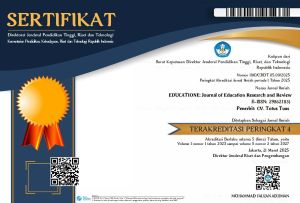PARENTAL EDUCATION AND ITS IMPACT ON SIBLING RIVALRY AMONG TEENAGERS
DOI:
https://doi.org/10.59397/edu.v3i2.105Keywords:
Adolescents, Educational Development, Parenting Style, Sibling Relationships, Sibling RivalryAbstract
Adolescence is a pivotal stage of development marked by emotional volatility and intensified sibling rivalry, a phenomenon particularly prevalent in Indonesian families. Prior evidence highlights parenting style as a critical determinant of sibling rivalry, yet research in Indonesian contexts remains limited. This study aims to analyze the influence of parenting styles—authoritative, authoritarian, and permissive—on the prevalence and severity of sibling rivalry among adolescents in Karawang. Utilizing a quantitative, causal-comparative design, 384 adolescents aged 11–17 completed validated scales assessing perceptions of parenting style and sibling rivalry. Multiple regression analysis revealed that authoritative parenting is significantly associated with reduced sibling rivalry, while both authoritarian and permissive parenting styles are linked to increased rivalry, with permissive parenting showing the strongest effect. Collectively, parenting styles accounted for 78.9% of the variance in sibling rivalry, emphasizing their central role in adolescent family dynamics. These findings affirm the universality of classic parenting theories and stress the urgent need for culturally adapted parental guidance programs in Indonesia. The study offers actionable recommendations for parents, educators, and policymakers seeking to foster harmonious sibling relationships and healthy adolescent development. Future research should investigate additional influencing factors, such as birth order, family stress, and socio-economic status, using longitudinal or mixed-method designs for a more comprehensive understanding.
Downloads
Published
How to Cite
Issue
Section
Citation Check
License
Copyright (c) 2025 EDUCATIONE

This work is licensed under a Creative Commons Attribution 4.0 International License.



















